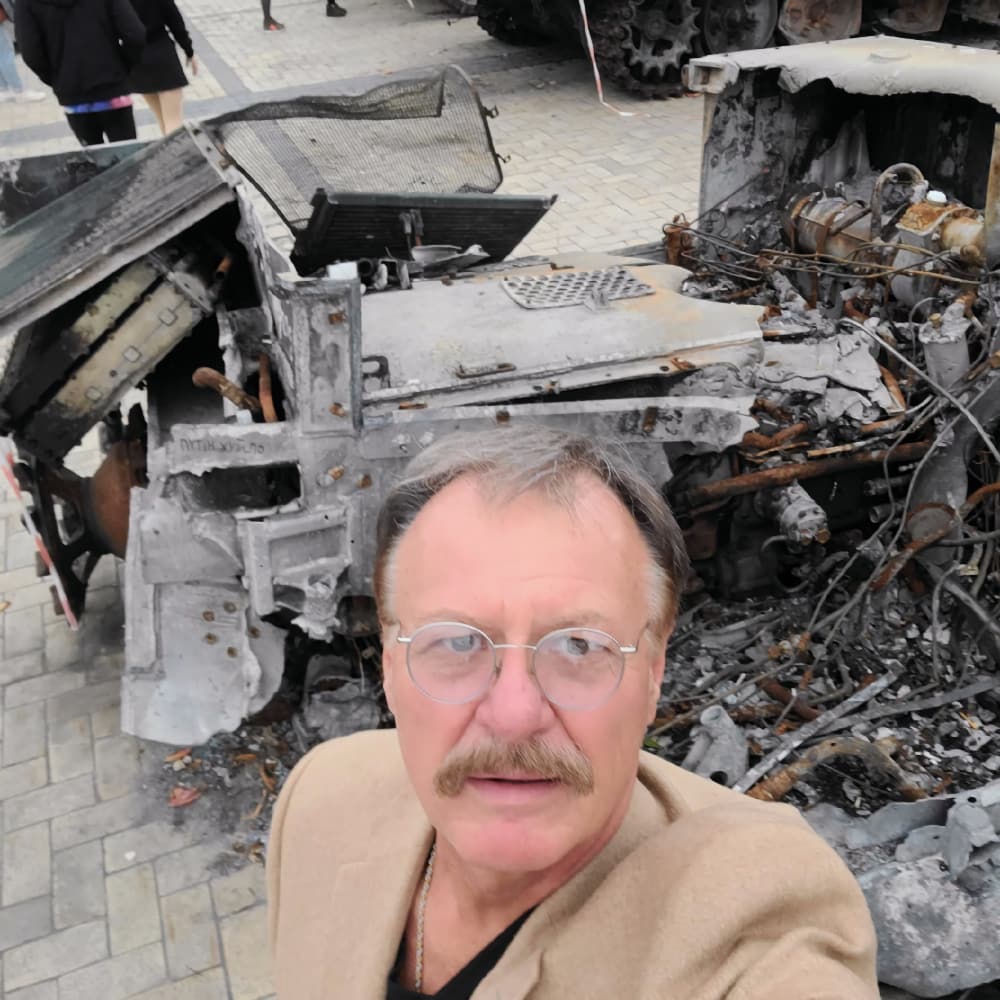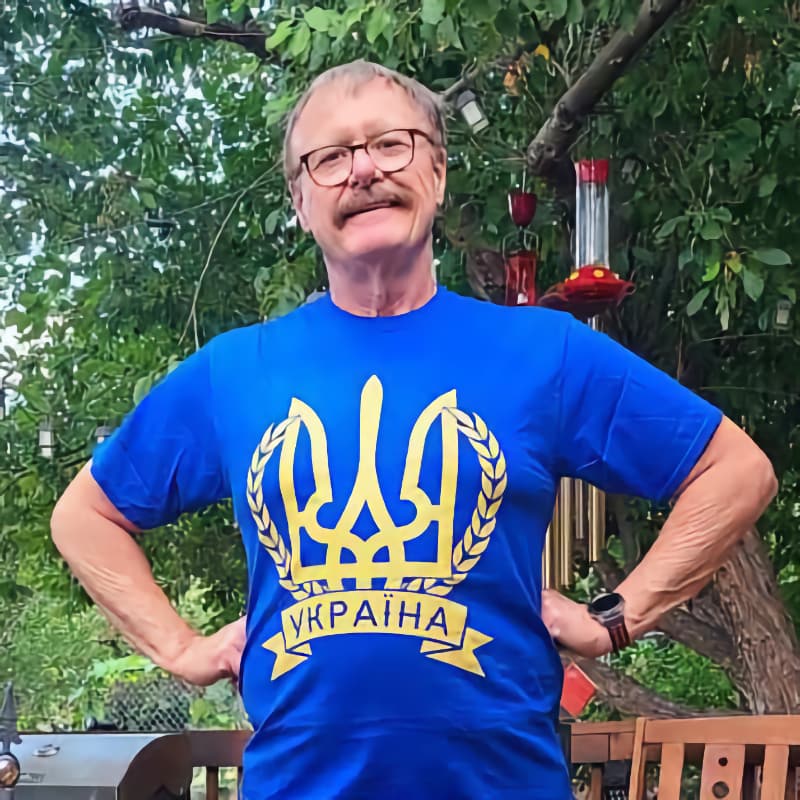
“Just Like Us”: An Independent Pediatrician’s Trip to Ukraine
Laramie PediatricsLaramie, WY
As news of the war in Ukraine escalated in 2022, Dr. Kent Kleppinger listened in with increasing concern from his practice in Laramie, Wyoming. When Dr. Kleppinger decided to step in to help physicians in Ukraine, he didn’t hesitate; he went all in.
Dr. Kent Kleppinger has become accustomed to making choices that match his creative – and sometimes bold – ideas. As a pediatrician approaching 40 years of practice, he spent many of those years practicing solo or with a nurse practitioner, and prides himself on the connections he makes to his families and patients. Like all skilled pediatricians, he’s quick to identify areas of need when it comes to children. So when he heard of the families suffering for medical care because of the war in Ukraine, he got it into his mind to go over and help – so with very little hesitation, he did just that.
Dr. Kleppinger – “Klep” to his patients – reflects that his high school guidance counselors told him he couldn’t study to become a doctor in the state of Wyoming. Accordingly, he split his studies between the University of Oklahoma and finished at Creighton University in Omaha, NE, but returned straight back to Wyoming, where he joined a solo doctor practice in Laramie, WY.
In 1992, the other doctor retired, and Klep was thrust into solo practice for the first time. “It scared the hell out of me for about 3 months until I knew I wouldn’t go bankrupt!” he laughs. “Once we got past that, it was great. It’s nice to be able to say, ‘I want this wall green,’ and then you have someone paint it green. No administration. I got to design my building, my rooms, and they’re all colorful, no numbers on the doors. Kids learn colors before numbers.”
Dr. Kleppinger is the solo practitioner at Laramie Pediatrics in Laramie, WY.
He writes and records music (“I’ve put out 7 CDs. Six of them are trash, but the seventh isn’t bad!”). After retiring from pediatrics, he’d like to be an usher at University of Oklahoma games, or work in a gift shop at Yellowstone National Park.
He hopes to return to Ukraine: “It’d be cool to see the country being rebuilt. Go over, spend time teaching residents in pediatrics. It’d be a hoot!”
His favorite ages to work with are four-year-olds, the “professional kids” and young teens whose bright futures he can glimpse. “You can ask a four-year-old, ‘What color car goes fastest? What kind of tree is the best to climb?’ and they just know, no hesitation.”
His love of pediatrics began early in residency. While he originally leaned towards family practice, he liked the hands-on aspects of pediatrics. “When I did a pediatrics rotation it was magical. The kids were fun to be around, and were a lot more entertaining and most of the time they get better without you doing anything!”
Considering what about his practice in Laramie he likes best, his answer is immediate: the kids!
“If you’re looking for fun, cool illnesses [to treat], you’ll starve to death [in general peds], it’s not there. You live on ear infections and head colds. We have a lot of amazing wonderful kids in my practice. I’ve gotten to watch kids literally grow up in my practice and turn around and bring their kids in. It’s very cool to see happen. You get to see them turn into real live adults with parenting skills and be good people. What’s kept me here and kept me going has just been connecting with kids and their families, but especially the kids.”
Klep’s passion for children made news of the war in Ukraine a particularly heartbreaking story. Many Americans could only watch media outlets with growing alarm and concern as civilians bore the weight of bomb threats, urban warfare, and uncertainty. According to UNICEF, the war has left 7.1 million kids in need of humanitarian assistance. Children have experienced violence, displacement, terror, and loss of family, friends, neighborhoods, education, and regular healthcare.
For Kent Kleppinger, his journey to Ukraine began with, in his words, an ‘intrusive thought’. “You could do this,” he recalls thinking – he could help the doctors and kids of Ukraine – though he immediately doubted the idea. “No, what do you mean? Are you crazy?”
“At some point in time, you’ll be tapped on the shoulder to do an adventure. Just go with it, enjoy it. It’s an amazing feeling to be on one of these crazy adventures, and you just remember every second because it’s so cool. Resist the urge to tell yourself rational reasons why you shouldn’t do it, and just go for it. Pack your bag and go along with the dwarves and the wizard and have fun!’Dr. Kent Kleppinger
Crazy idea or not, Klep began to Google. He found the website for the Kyiv government and found the number for the Ministry of Health. Abandoning hesitation, he gave the office a call to offer his assistance, however it was needed. After an exchange with the woman who answered (who didn’t speak English, nor does Klep speak Ukrainian) Klep found himself on the phone with the nearest English-speaking person: who just so happened to be the Deputy Minister of Health himself.
“Just come,” the Minister told him, at Klep’s request to help. Just in case, he called around to Kyiv hospitals, and the refrain was the same: Ukrainian doctors needed the help and nobody had time to waste. And that’s all the Laramie doctor needed to hear.
Without further ado, Klep was off to Kyiv and got to work. He saw patients and families. He disliked the volunteer requirements of 6 hour shifts of 16 patients a day. The Poland refugee center he worked in saw over 2,000 families a day. He wanted to work 7 days a week and see patients as often as he could. He wanted to contribute more.
Klep quickly found that while the hands-on pediatric work he offered was appreciated, the issues the doctors he worked with faced day-to-day had systemic roots. The Ukrainian neonatologists, pediatric anesthesiologists, and pediatricians wanted education, training, lectures. They had a desperate need for equipment, as displaced hospitals and civilians and bombings meant that equipment was either unavailable or had been damaged.
He recalls that one day, late in the afternoon, a doctor approached him and asked if he was American. When Klep answered yes, he was asked to join the man on a trip to the hospital, “So we – this short 6’5” man and I – got into his tiny car and off we went.” At the hospital, he found his companion was named Oleg, and he was the head of OB-GYN of Kyiv Oblast (the province which includes Kyiv in Ukraine). They also met with Anastasia, head of neonatology for the Kyiv region.
The Kyiv doctors emphasized their need for education, and asked Klep – would he be willing to give lectures to their residents? “They admire the American healthcare system,” he explains. “They want to be just like us. They want protocols for infant antibiotics, and they need ventilators, they need high-speed canulas.”
So, once he returned to the United States, Klep began to make a list. He began work with Denver Children’s Hospital to arrange for equipment to be transferred to Kyiv, where it was needed most. He plans a return visit to Ukraine to give lectures, and hopes to wrangle a few more pediatricians to offer the same for Ukrainian residents. He hopes to convince the American Academy of Pediatrics to offer Ukrainian pediatricians a free temporary membership so that the doctors can access the journals, training, and assistance they need.
He firmly believes that his story is best viewed as a lesson for all pediatricians. He fears too much emphasis on his personal contribution will prevent other doctors from seeing the power they already possess to enact powerful change for all children in need. More than once, he remarked, “It’s not about me. It’s about them – the kids and the docs.”
Despite the extreme challenges facing the families and pediatricians of Ukraine as a direct result of the conflict, Klep is glad he took the journey to help however he could. “It was amazing to be there, and wonderful to work with [the Ukrainian doctors], and they appreciate anything anyone does for them. They want to be appreciated and treated with dignity. That’s an important message for people to understand.”
“The other side, from a personal standpoint: “At some point in time, you’ll be tapped on the shoulder to do an adventure. Just go with it, enjoy it. It’s an amazing feeling to be on one of these crazy adventures, and you just remember every second because it’s so cool. Resist the urge to tell yourself rational reasons why you shouldn’t do it, and just go for it. Pack your bag and go along with the dwarves and the wizard and have fun!’”
Allie Squires is The Independent Pediatrician‘s editor and the marketing content writer for PCC. She holds a M.S. in Professional Writing from NYU, and BAs in Writing and Literature from SUNY Plattsburgh. When she’s not writing, she enjoys reading and exploring her adopted home state of Vermont.





